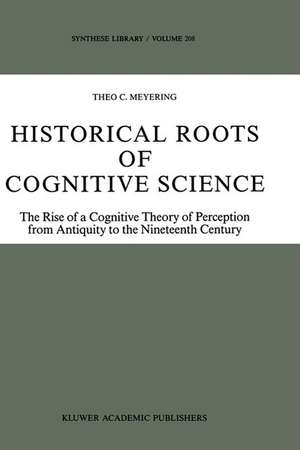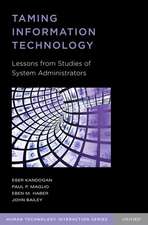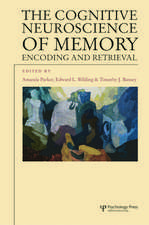Historical Roots of Cognitive Science: The Rise of a Cognitive Theory of Perception from Antiquity to the Nineteenth Century: Synthese Library, cartea 208
Autor Theo C. Meyeringen Limba Engleză Hardback – 31 iul 1989
| Toate formatele și edițiile | Preț | Express |
|---|---|---|
| Paperback (1) | 943.57 lei 6-8 săpt. | |
| SPRINGER NETHERLANDS – 26 sep 2011 | 943.57 lei 6-8 săpt. | |
| Hardback (1) | 949.55 lei 6-8 săpt. | |
| SPRINGER NETHERLANDS – 31 iul 1989 | 949.55 lei 6-8 săpt. |
Din seria Synthese Library
- 15%
 Preț: 638.43 lei
Preț: 638.43 lei - 18%
 Preț: 989.98 lei
Preț: 989.98 lei - 15%
 Preț: 596.69 lei
Preț: 596.69 lei - 18%
 Preț: 903.93 lei
Preț: 903.93 lei - 15%
 Preț: 586.88 lei
Preț: 586.88 lei - 15%
 Preț: 696.50 lei
Preț: 696.50 lei - 18%
 Preț: 892.90 lei
Preț: 892.90 lei - 15%
 Preț: 643.34 lei
Preț: 643.34 lei -
 Preț: 282.33 lei
Preț: 282.33 lei - 5%
 Preț: 372.19 lei
Preț: 372.19 lei -
 Preț: 443.10 lei
Preț: 443.10 lei - 15%
 Preț: 637.59 lei
Preț: 637.59 lei - 18%
 Preț: 958.88 lei
Preț: 958.88 lei - 15%
 Preț: 642.36 lei
Preț: 642.36 lei - 18%
 Preț: 1230.66 lei
Preț: 1230.66 lei - 15%
 Preț: 642.83 lei
Preț: 642.83 lei - 18%
 Preț: 1000.39 lei
Preț: 1000.39 lei -
 Preț: 389.70 lei
Preț: 389.70 lei - 15%
 Preț: 637.28 lei
Preț: 637.28 lei - 18%
 Preț: 952.26 lei
Preț: 952.26 lei - 18%
 Preț: 1231.32 lei
Preț: 1231.32 lei - 15%
 Preț: 645.96 lei
Preț: 645.96 lei -
 Preț: 395.85 lei
Preț: 395.85 lei -
 Preț: 400.47 lei
Preț: 400.47 lei - 18%
 Preț: 1225.48 lei
Preț: 1225.48 lei - 15%
 Preț: 638.89 lei
Preț: 638.89 lei - 18%
 Preț: 1232.09 lei
Preț: 1232.09 lei -
 Preț: 380.45 lei
Preț: 380.45 lei -
 Preț: 394.87 lei
Preț: 394.87 lei - 15%
 Preț: 640.37 lei
Preț: 640.37 lei - 15%
 Preț: 639.08 lei
Preț: 639.08 lei -
 Preț: 381.98 lei
Preț: 381.98 lei - 15%
 Preț: 643.00 lei
Preț: 643.00 lei - 15%
 Preț: 672.29 lei
Preț: 672.29 lei
Preț: 949.55 lei
Preț vechi: 1157.98 lei
-18% Nou
Puncte Express: 1424
Preț estimativ în valută:
181.69€ • 189.70$ • 150.38£
181.69€ • 189.70$ • 150.38£
Carte tipărită la comandă
Livrare economică 04-18 aprilie
Preluare comenzi: 021 569.72.76
Specificații
ISBN-13: 9780792303497
ISBN-10: 0792303490
Pagini: 252
Ilustrații: XX, 252 p.
Dimensiuni: 155 x 235 x 18 mm
Greutate: 0.56 kg
Ediția:1989
Editura: SPRINGER NETHERLANDS
Colecția Springer
Seria Synthese Library
Locul publicării:Dordrecht, Netherlands
ISBN-10: 0792303490
Pagini: 252
Ilustrații: XX, 252 p.
Dimensiuni: 155 x 235 x 18 mm
Greutate: 0.56 kg
Ediția:1989
Editura: SPRINGER NETHERLANDS
Colecția Springer
Seria Synthese Library
Locul publicării:Dordrecht, Netherlands
Public țintă
ResearchCuprins
I. Introduction.- II. Reconstruction of the history of medieval and (post-) Cartesian theories of perception in terms of the negative heuristics of their respective research programs. Basic epistemological contrasts.- III. The formation of competing optical traditions in early and late antiquity.- (1) The various ‘optical’ research traditions in early and late antiquity represent rival research programs into the theory of visual perception.- (2) The Aristotelian theory of vision.- (3) The Stoic-Galenic tradition.- (4) The geometrical tradition.- IV. The Identity Postulate at work in various research programs in the theory of vision during late antiquity and during the Arab and European Middle Ages.- (1) The Identity Postulate at work in the Stoic-Galenic theory of vision.- (2) The Identity Postulate at work in the geometrical tradition in the theory of vision.- (3) The Identity Postulate at work in Alhazen’s theory of vision.- (4) The Identity Postulate reinforced by the Baconian-Alhazenian synthesis in optical theory. Internal explanations facilitated by the proposed rational reconstruction.- (5) The internal disintegration of the research program defined by the Identity Postulate during the 16th century.- V. The mathematization of physics and the mechanization of the world-picture gradually prepared in the development of medieval optics rather than in that of terrestrial or celestial mechanics.- VI. Mechanicism and the rise of an information theory of perception. A naturalistic reconstruction of (post-) Cartesian epistemology.- (1) Keplerian dioptrics, Cartesian mechanicism, and the rise of justificationist methodologies.- (2) Complete demonstration in science impossible. The need of conjectural theories affirmed.- (3) Ambivalence towards any alleged sources of‘immediate’ knowledge. Epistemology founded on an empirical theory of the senses and the mind.- (4) The rise of an information theory of perception. Internal tensions of the representationist research program.- (5) The representationist research program.- (6) Malebranche and the Cartesian research program into optical epistemology.- (7) Conclusion.- VII. Epistemological issues underlying the nineteenth century controversies in physiological optics. The Helmholtzian Program.- (1) The 18th century. Rationalist and empiricist developments. Cross-fertilizations of originally competing programs.- (2) The Helmholtzian research program into the theory of perception. The true logic of discovery revealed by rational reconstruction of the grand movement of intellectual history rather than by ‘faithful’ intellectual biographies.- (3) The relevance of German Romanticism to the Helmholtzian program.- (4) Helmholtz’s theory of subliminal cognitive activity.- (5) Helmholtz’s research program contrasted with competing epistemological programs.- VIII. The interplay between philosophy and physiology in Helmholtz’s view.- (1) Helmholtz’s conception of philosophy in historical perspective.- (2) Müller’s Principle of Specific Sense Energies.- (3) Helmholtz’s theory of color vision.- (4) Helmholtz’s theory of physiological acoustics.- (5) The philosophical significance of the Principle of Specific Sense Energies.- IX. Helmholtz’s theory of the perception of space.- (1) Sensation and perception.- (2) The general idea of space and perceptual localization.- (3) The intuitionist theories of Müller and Hering.- (4) Helmholtz’s empirical theory of perception.- (5) Methodological arguments in defense of the empirical theory of perception.- (6) The philosophicalsignificance of the intuitionist-empiricist controversy.- (7) The general idea of space.- X. Helmholtz’s theory of unconscious inferences.- (1) The need of an empirical non-introspective psychology.- (2) Helmholtz’s theory not a mechanistic theory, but a truly cognitive theory of information processing.- (3) Helmholtz’s theory of a continuum of cognitive functions beyond the edge of consciousness and beyond the grasp of verbal articulation.- (4) Helmholtz’s theory dogmatically dismissed by the twentieth century ban on psychologism. Yet his cognitive theory superior as compared to traditional alternatives.- (5) The synthetic functions of subconscious mental operations according to 19th and 20th century theoretical developments. The problem of realism.- XI. The epistemological outcome of Helmholtz’s naturalism. Hypothetical realism.- (1) Helmholtz’s novel theory of causality in its relation to Kant, Reid and traditional empiricism.- (2) Lack of an adequate psychology. Weaknesses of Helmholtz’s theory.- List of abbreviations.
















